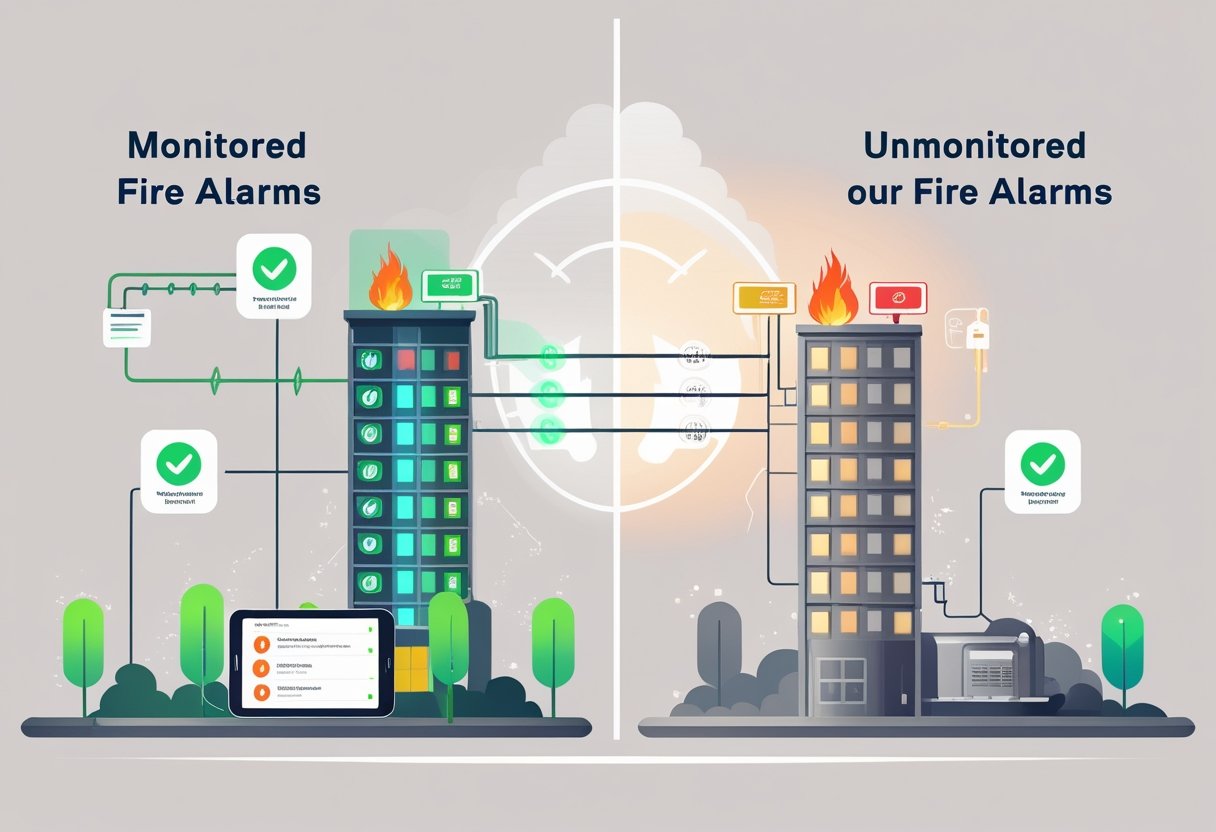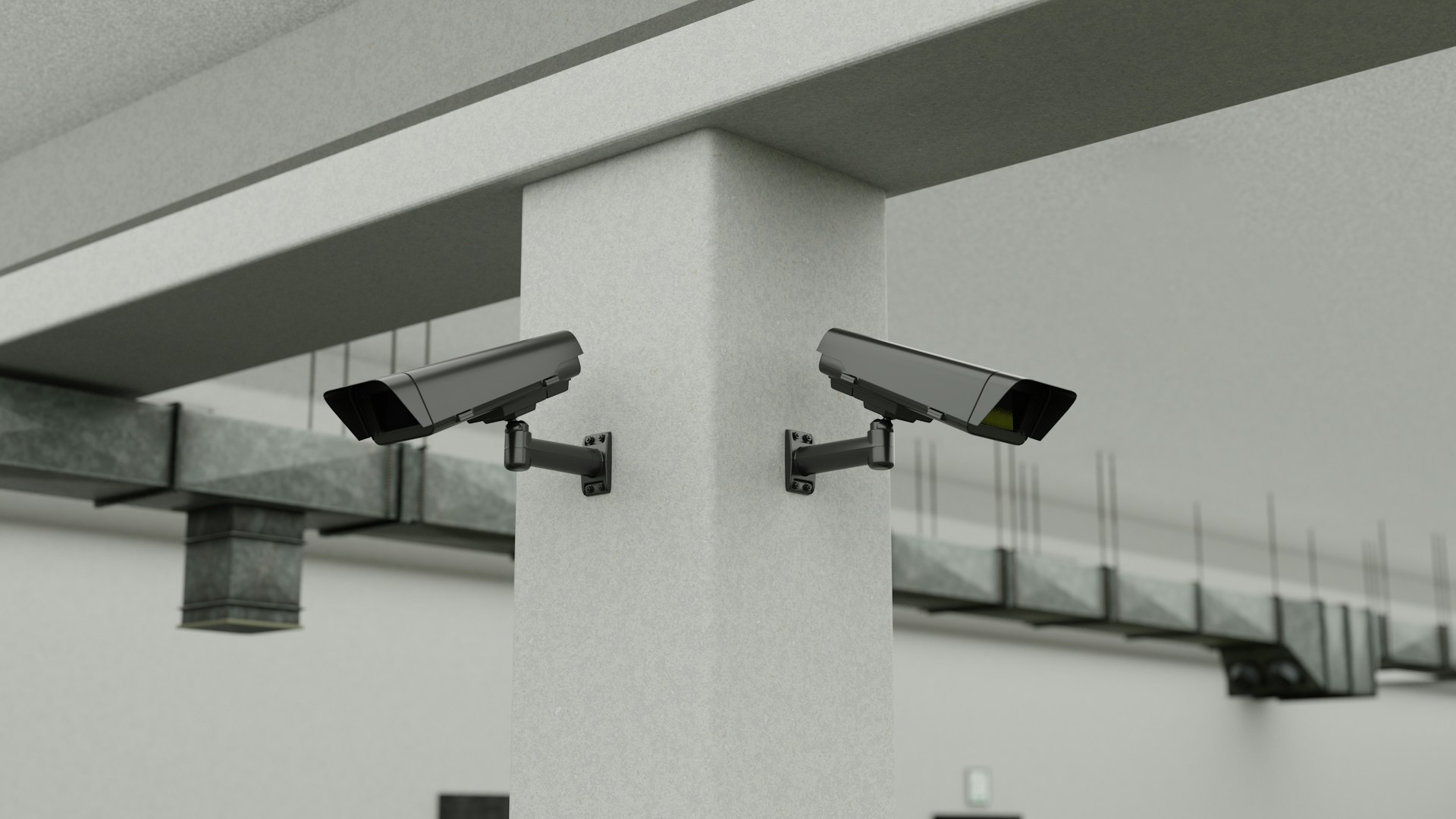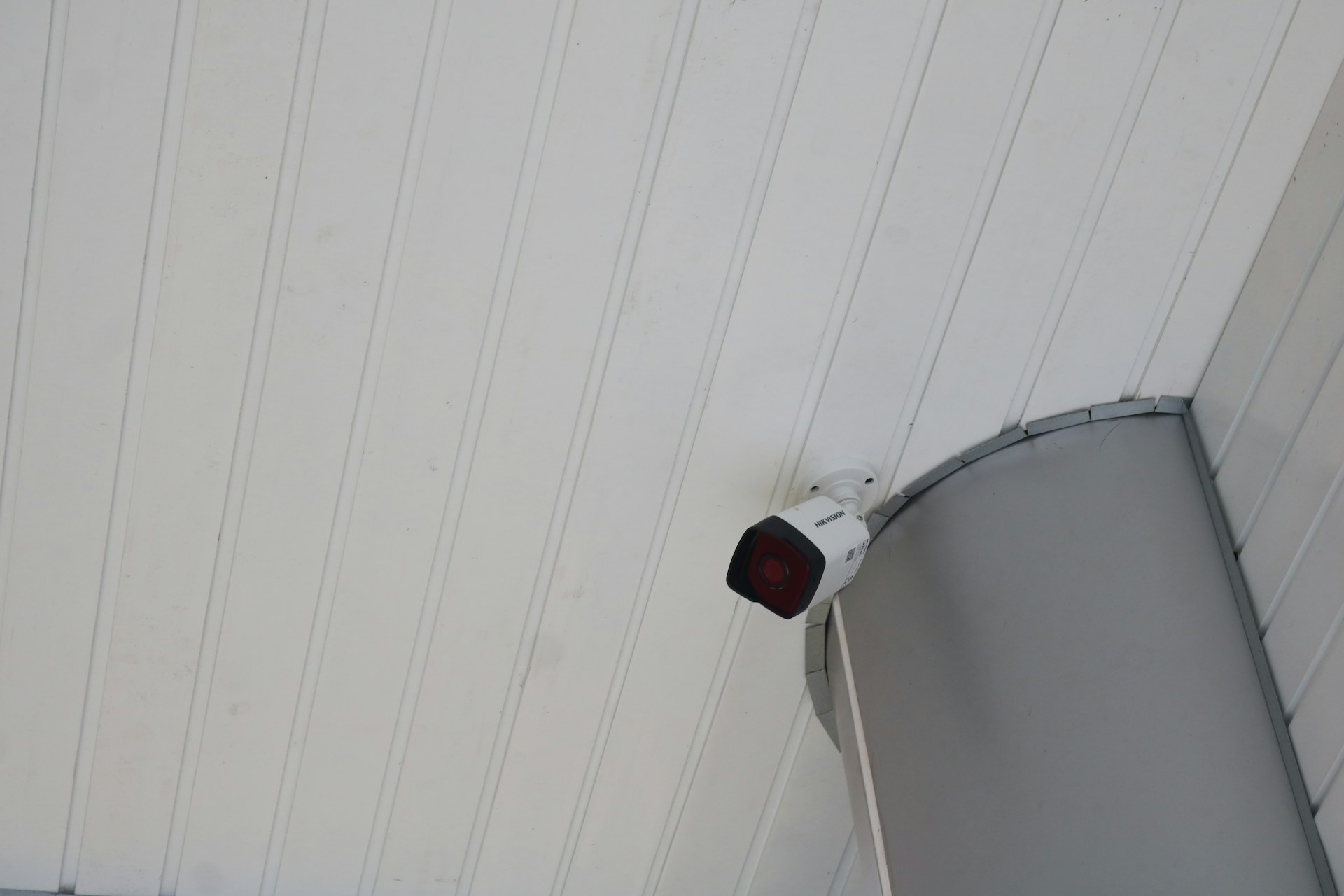When it comes to safeguarding your home or business, understanding the differences between monitored and unmonitored fire alarms is crucial. Monitored fire alarms offer real-time response by alerting a professional monitoring service, ensuring quick intervention in emergencies. In contrast, unmonitored alarms rely on you or others to respond to alerts, which can lead to delays during critical moments.
Choosing the right system can significantly impact your safety and peace of mind. Monitored systems provide 24/7 surveillance and automatic notifications to emergency services, making them a reliable option for those who prioritize immediate action. On the other hand, unmonitored alarms may be more cost-effective but require you to take swift action when an alarm goes off.
Understanding your options will help you make an informed decision tailored to your specific needs. Explore how each type of fire alarm can enhance your security and ensure your loved ones and property are adequately protected in the greater Houston area.
Understanding Monitored and Unmonitored Fire Alarms
Fire alarms play a vital role in safety and protection. Understanding the differences between monitored and unmonitored fire alarm systems can help you choose the right option for your needs, ensuring optimal security for your home or business.
What Is a Monitored Fire Alarm System?
A monitored fire alarm system is connected to a central monitoring station that oversees alarms in real-time. When smoke or fire is detected, the system automatically alerts the monitoring center. They then notify local emergency services, ensuring a rapid response.
Such systems often include features like:
- 24/7 Monitoring: Continuous oversight enhances safety.
- Immediate Alerts: Quick notification to emergency responders saves time.
- Real-time Updates: Remotely accessible information about your system's status.
In Houston, having a monitored system means you benefit from local professionals trained to handle emergencies effectively.
What Is an Unmonitored Fire Alarm System?
Unmonitored fire alarm systems operate independently and do not connect to a monitoring center. When an alarm is triggered, it typically emits a loud sound to alert occupants. However, no external authorities are notified automatically.
Key characteristics include:
- Cost-Effective: Generally, these systems are less expensive to install.
- User Responsibility: You need to call emergency services if you hear the alarm.
- Simple Design: Fewer components make setup easier.
These systems may be suitable for small spaces or temporary use but can leave gaps in safety, especially in larger or commercial environments.
How Alarm Systems Work
Both monitored and unmonitored fire alarm systems function similarly at their core—they detect smoke and heat. Common components include:
- Sensors: Detect fire or smoke.
- Control Panel: Central unit that processes signals from sensors.
- Notification Devices: Alarms and lights that alert occupants.
In a monitored system, the control panel sends signals to the monitoring center, while in an unmonitored system, the alarm primarily alerts those nearby. Understanding these mechanics can help you assess which option better fits your safety requirements in the Houston area.
Key Differences Between Monitored and Unmonitored Fire Alarms
When considering fire alarm systems, distinguishing between monitored and unmonitored options is essential for your safety and peace of mind. Each system has unique features that cater to different needs and situations, impacting how alarms are managed and how quickly help can be summoned.
Central Monitoring Station Involvement
Monitored fire alarms are connected to a central monitoring station operated by a security company. This station continuously monitors your alarm system for any signals that indicate a fire. When an alarm is triggered, trained personnel assess the situation and contact emergency services if necessary.
In contrast, unmonitored fire alarms operate independently. They will signal an alarm locally, but no external monitoring occurs. You bear the responsibility of alerting authorities, which can lead to delays, especially during emergencies.
Notification and Response Processes
With monitored fire alarms, notifications are immediate. Upon detection of a fire, the system alerts the central monitoring station, which can quickly dispatch emergency responders. The professionals can ensure that fire services are on the way while you manage the situation.
Unmonitored systems do not provide this safety net. If an alarm goes off, you receive an audible alert, but you must take the initiative to call for help. In a crisis, this extra step can hinder a timely response, making monitored systems far more effective in emergencies.
Maintenance and Support Services
Monitored fire alarms often come with maintenance and support services included in the package. This setup means routine checks and updates on your system are taken care of, ensuring that everything is functioning correctly.
Unmonitored systems typically require you to manage maintenance, meaning you are responsible for ensuring that batteries are replaced and that the system is operational. Neglecting these duties can lead to failures when you need assistance the most. Working with a security company can enhance the reliability of monitored systems in terms of ongoing support.
Benefits and Limitations of Monitored Fire Alarms
Monitored fire alarms offer numerous advantages that enhance security and peace of mind. While they come with certain limitations, understanding these aspects will help you make an informed decision about your fire safety needs.
Enhanced Security Coverage
With a monitored alarm system, your property is under constant surveillance. These systems typically include smoke detectors and heat detectors that automatically alert monitoring centers when activated.
This means that even if you are away, someone is always watching over your space. Unlike traditional alarms, which only notify you or sound an alarm locally, monitored systems ensure that help is on the way.
As a result, this continuous coverage significantly reduces the response time in an emergency situation, which can be critical to preserving life and property.
Immediate Emergency Response
One of the most significant advantages of monitored fire alarms is the immediate response they facilitate. When a monitored smoke or fire detector is triggered, the monitoring center swiftly evaluates the situation.
If necessary, they dispatch local emergency services without delay. This immediate action reduces the time it takes for firefighters to reach your location, which can make a substantial difference during a fire incident.
Moreover, some monitored systems can also send alerts directly to your mobile device, keeping you informed in real time.
Insurance Premium Advantages
Installing a monitored fire alarm system can positively impact your insurance premiums. Most insurance providers offer discounts for homes equipped with monitored systems, recognizing the lower risk associated with them.
Often, you can save up to 20% on your homeowner's insurance by having these alarms in place.
This financial benefit can offset the monthly fees of monitoring services, creating a compelling case for investing in monitored fire protection.
Reduced False Alarms
Monitored fire alarm systems are generally designed to minimize false alarms through advanced technology. Many systems incorporate multiple detection methods, such as heat detection alongside smoke detection, to differentiate between actual emergencies and false triggers.
This capability not only prevents unnecessary dispatches of the fire department but also helps maintain good relationships with local emergency services.
While no system is foolproof, a monitored alarm's sophisticated technology substantially reduces the occurrence of false alarms, ensuring that when alerts occur, they are genuine calls for help.
Advantages and Drawbacks of Unmonitored Fire Alarms
Unmonitored fire alarms offer distinct pros and cons that can impact your safety and budget. Understanding these aspects allows you to make an informed decision tailored to your specific needs.
Cost-Effectiveness
One of the primary advantages of unmonitored fire alarms is their cost-effectiveness. These systems typically have lower initial costs compared to monitored options. You can purchase detectors without the recurring monthly fees associated with professional monitoring services.
The absence of a monitoring subscription means that you can allocate your funds elsewhere, such as home improvements or additional safety measures. Additionally, many unmonitored alarm systems are DIY-friendly, allowing you to save on installation costs. This affordability makes them appealing for budget-conscious homeowners in the greater Houston area.
Customizability and Self-Installation
Unmonitored alarm systems offer significant customizability. You can choose the types of detectors that best suit your space, from smoke detectors to heat sensors. This allows for a tailored security approach, as you can decide where to place each device.
Moreover, self-installation is typically straightforward. Most unmonitored systems come with user-friendly instructions, enabling you to set it up without the need for professional assistance. This flexibility in configuration empowers you to adapt the system as you see fit while ensuring that your safety needs are met.
Limitations in Emergency Situations
Despite their benefits, unmonitored fire alarms do have limitations, particularly in emergencies. When a fire occurs, the system sounds an alarm, but there is no automatic alert sent to emergency services. This delay could be critical in life-threatening situations.
If you are unable to respond quickly or if the fire spreads rapidly, relying solely on an unmonitored system may put you and your property at risk. The responsibility falls entirely on you to contact emergency responders, which can cost precious time and jeopardize safety. Awareness of these limitations is crucial for making a responsible decision regarding fire safety in your home.
Choosing the Right Fire Alarm System for Your Needs
Selecting an appropriate fire alarm system hinges on several crucial factors. Your choice significantly impacts safety, cost, and ease of use. Important considerations include your home's unique security needs, available options within the Houston area, and the level of professional expertise required for installation and maintenance.
Factors to Consider for Home Security
When evaluating home security systems, think about the specific risks your property faces. Factors like the size of your home, any previous incidents, and your neighborhood's safety record can influence your decision.
Consider including:
- Type of Property: Residential or commercial?
- Building Layout: Open or segmented spaces may require different systems.
- Budget: Establish initial and ongoing costs for monitoring services.
- Response Time: How quickly do you need help in an emergency?
These aspects help tailor a system that meets your needs effectively.
Comparing Home Security System Options
In Houston, you have various fire alarm system options. You might choose a monitored or unmonitored system, each with its benefits.
- Monitored Systems: Offer 24/7 surveillance, immediate alerts to emergency services, and peace of mind. They typically involve a monthly fee but provide greater safety assurance.
- Unmonitored Systems: Generate an alarm that requires someone to contact authorities. They are often more affordable but depend on presence for notifications, potentially delaying response times.
Evaluating these options based on your lifestyle helps you find the right balance between cost and safety.
Professional vs DIY Security Setup
Deciding between a professional installation and a DIY system can affect your fire alarm's effectiveness.
- Professional Setup: Engaging a security company ensures your system is correctly installed and configured. They have the expertise to optimize your fire alarm for maximum efficiency and compliance with local regulations.
- DIY Installation: This option can save you money initially, but it requires you to have the necessary skills and knowledge. Mistakes in setup might lead to unusable systems during emergencies.
Choosing the appropriate installation method impacts your system’s reliability and responsiveness during a fire.
Conclusion and Recommendations
When choosing between monitored and unmonitored fire alarms, consider your specific needs and situation. Each type offers distinct advantages.
Monitored Fire Alarms:
- Automatically alert emergency services.
- Best for those who want increased security and peace of mind.
- Ideal for homes and businesses where timely response is crucial.
Unmonitored Fire Alarms:
- Cost-effective and reliable for self-monitoring.
- Require you to contact emergency services.
- Suitable for smaller properties or locations where a quick alert is less critical.
Recommendations:
- Assess Your Environment:
Consider the size of your property and the presence of occupants. Larger buildings benefit more from monitored systems. - Evaluate Budget:
Factor in the ongoing costs of monitored systems versus the one-time cost of unmonitored setups. - Understand Local Regulations:
Ensure compliance with fire safety codes in the greater Houston area, as they may influence your choice. - Prioritize Features:
Evaluate features such as remote monitoring and integration with other security systems based on your security needs.
Ultimately, your choice should align with your safety priorities and financial considerations. By understanding both options, you can make an informed decision that best protects your property.
Frequently Asked Questions
You may have questions about the distinctions and benefits of monitored versus unmonitored fire alarm systems. Understanding these details is essential for making an informed decision about fire safety for your property.
What are the primary differences between monitored and unmonitored fire alarm systems?
Monitored fire alarm systems connect directly to a central monitoring station. This allows for immediate response by emergency services when an alarm is triggered. In contrast, unmonitored systems are standalone; they sound an alarm locally but do not notify any authorities.
How do monitored fire alarm systems provide additional safety compared to unmonitored systems?
Monitored systems continually transmit signals to a monitoring center, ensuring rapid response even if you are not present. This added layer means that first responders are alerted promptly, increasing the likelihood of minimizing damage and ensuring safety.
What are the cost implications of installing a monitored fire alarm system versus an unmonitored one?
Monitored fire alarm systems generally involve higher installation costs due to the equipment and ongoing monitoring fees. Unmonitored systems have lower upfront costs but may lead to higher expenses in case of a fire due to potential damage or loss.
Can unmonitored fire alarms be upgraded to monitored systems, and if so, what does the process involve?
Yes, unmonitored fire alarms can often be upgraded to monitored systems. The process involves installing a monitoring module, connecting to a central station, and updating the system's notifications to communicate with emergency services.
What impact does a monitored fire alarm system have on emergency response times in the event of a fire?
Monitored fire alarm systems significantly reduce emergency response times. As soon as an alarm activates, the monitoring center contacts emergency services, allowing for a quicker reaction than waiting for someone to notice and call for help.
How does maintenance differ between monitored and unmonitored fire alarm systems?
Maintenance of monitored systems often includes routine checks by the monitoring company, ensuring all components function correctly. Unmonitored systems typically require you to handle maintenance, which can lead to potential gaps in operational readiness without regular checks.
.svg)



.svg)


.svg)



